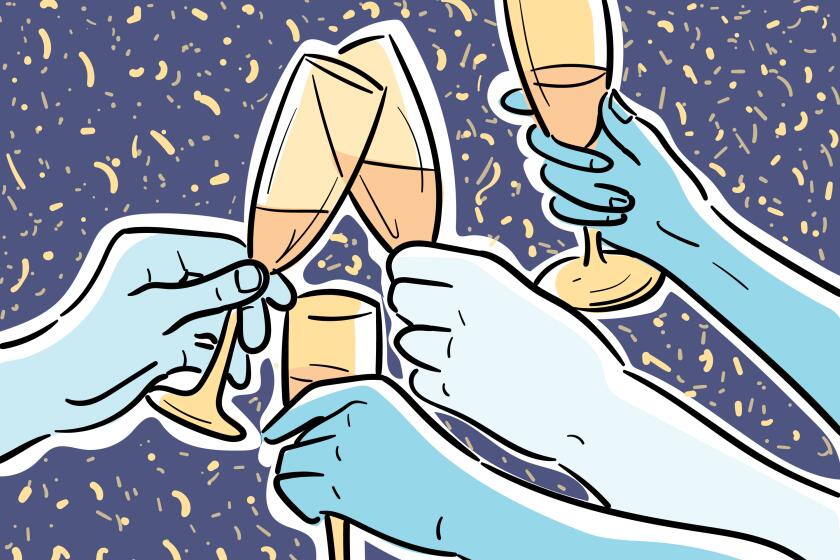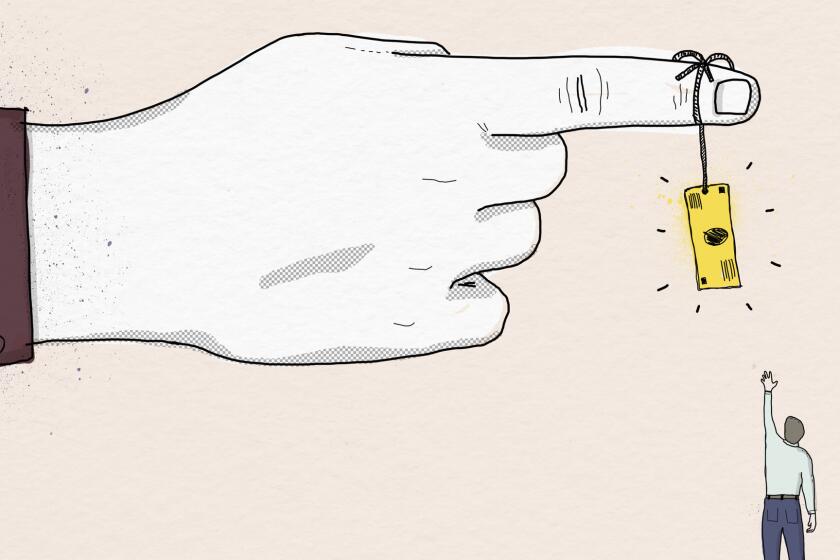Opinion: Forget new habits in the new year. Find joy in rituals with others

- Share via
There is an irony to New Year’s Eve celebrations — one that I regularly reflect on owing to my specific field of psychological study: the rituals humans perform. On Dec. 31, we stay up late (by definition), we drink too much, we kiss people we maybe wouldn’t otherwise be kissing. And then on Jan. 1, we plan to become perfect with our resolutions to get more sleep, to drink less, to spend more time with loved ones.
But do we really want to live a life of perfect habits — to be someone who gets up at the same time every day, has the same healthy breakfast, exercises for the same duration, never eats ice cream or drinks wine, and is in bed by 9 p.m.?
In a year when antisemitism flowed freely, light melancholy centers me. It tells me I am capable of forgiving in the same way my grandparents must have been to live here.
Habits are great, but they’re very black and white. Rituals come in technicolor. Many rituals, I’ve come to believe, are a unique human invention to remind us to try, at least every so often, to live fully. And a new ritual can be joyous in a way that a new habit is not.
Rituals remind us to savor our experiences. Phrases like “stop and smell the roses” are directly contrary to trying to maximize our productivity every minute of our lives — which should make us view the latter with suspicion. We probably shouldn’t be drinking Champagne every day, but New Year’s offers us the excuse or — a better word — the opportunity to engage in the act of savoring. Retrieving that elegant glass we use only rarely, popping the cork, offering a few words of gratitude and good luck, clinking crystal, and then letting the effervescence tickle your taste buds. It beats cracking open a soda on the couch.
A New Year’s resolution to run your age in 2022 could thwart midlife cynicism.
Even rituals that encourage us to consume less can serve as a reminder to savor when we do consume more. Anyone who has ever given up food or drink for a religious holiday — Ramadan, Yom Kippur, Lent — knows that a return to consumption makes what was forfeited taste all the better. And this is backed up by research: Taking breaks from the things we love — from music to massage chairs — makes those experiences more pleasurable.
Another benefit associated with rituals: they remind us to savor our experiences with others. They encourage us to take the time to gather with loved ones in ways that we otherwise might not. Drinking Champagne with others beats both soda and drinking alone.
Resolutions help soften the blow of what we failed to accomplish last year, and they give us hope for who we might become.
In one survey that my research team conducted of more than 150 people, almost 40% reported that their family had an annual New Year’s tradition. Often, these respondents’ ceremonial acts centered on specific drinks — Crown Royal with Canada Dry, or Russian vodka with cranberry juice — that were consumed together only on that evening. Intriguingly, 90% of those who said they had a family ritual also said they gathered together in person on New Year’s Eve. But for families who didn’t have a unifying ritual, barely more than half gathered together.
If you think of your own extended family — your aunts, uncles, cousins — you’ll likely realize that most, if not all, of your interactions with them have occurred on holidays. Would you even know your Uncle Bob if not for Thanksgiving? It’s the special occasions that serve as the prompt to gather, and without those prompts, suddenly our families fail to assemble and can move from being extended to estranged.
In the next few days millions of Americans will make New Year’s resolutions — and about a third of those will have something to do with improving health and fitness.
And enacting our traditions together helps even more than simply getting together. In our study, people who reported that their families gathered to celebrate a New Year’s rite not only enjoyed the day more, but reported being less distracted and more present when compared to people whose families gathered but did not share a special tradition.
Even if by an extraordinary act of willpower we make it through January with perfect habits, we inevitably encounter Valentine’s Day in February, when we encourage the people we love to eat more chocolate. And, of course, March brings St. Patrick’s Day, and we all know what happens then. Again and again, many of our traditions and rituals remind us to savor life.
It can be a good thing to gather at the stroke of midnight on New Year’s Eve and vow to try to live a healthier life. But even when our resolution for this year is the same as last year, and maybe even the year before that, our stubborn refusal to toe the line of self-discipline may not be indicative of total failure. Rather, it could be evidence that, once again, we had an interesting, rich year spent doing things enjoyably outside the lines with loved ones.
Michael Norton is a professor of business administration at Harvard Business School and author of the forthcoming book, “The Ritual Effect: From Habit to Ritual, Harness the Surprising Power of Everyday Actions.”
More to Read
A cure for the common opinion
Get thought-provoking perspectives with our weekly newsletter.
You may occasionally receive promotional content from the Los Angeles Times.














